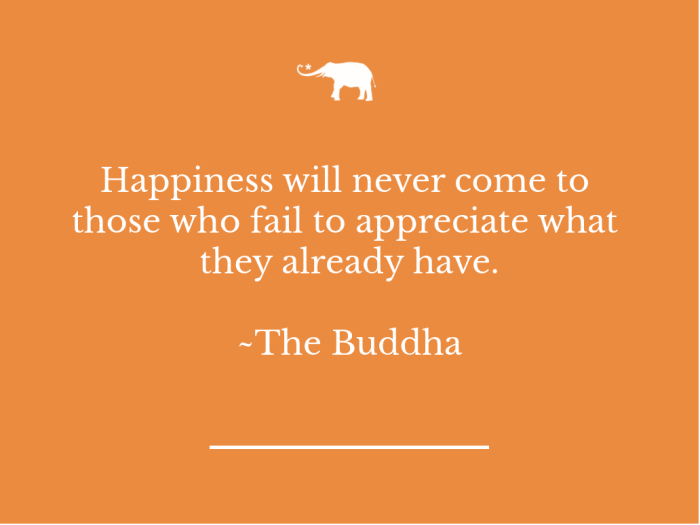Pursuit of want is so endemic that satisfaction of need often goes unappreciated.
Life’s essentials are taken for granted. Clean water, warmth, shelter, food, and love are expected rather than valued.
Consider food. Rather than enjoying eating, meals have become a chore. Rushing them to save time to go chasing money and possessions is commonplace.
There is nothing inherently bad in wishing for something pleasurable. The key difference is between desire and craving. The first can be managed; the second suggests desperation.
Constant bombardment by offers of credit doesn’t help. In the not-so-distant past, people saved to buy desired items. The instant gratification that loaning money brings was rare.
The problem with immediately satisfying any desire is it automatically encourages desire for the next big purchase. It also creates false perceptions. Everybody else seemingly has what you crave, so why shouldn’t you?
Imagine you’re driving in an old, perhaps slightly battered, car. A brand-new, more expensive vehicle overtakes you. Thoughts spring to mind about how you have “failed” because someone is apparently farther ahead in the game of life than you.
Those thoughts become habitual. It puts you on flight or fight because you feel vulnerable. Your brain starts to wire that way.
Worse still, it becomes a vicious circle. You feel down, so you seek reassurance. However, you’re looking at life through the wrong lens.
You will likely soon find yourself in another similar situation, this is called confirmation bias. There will always be somebody who seemingly has more than us.
From that position, it is easy for anxiety and depression to take hold.
Now, let’s take a different perspective for a moment. You are travelling from A to B in your car, just like the person overtaking you. You’re both going to get there, and the how is a mere detail.
Desperate pursuit of instant happiness often sinks people into debt. Credit cards maxed to their limits and various loans. All translate into extreme pressure to make ends meet.
Take a second look at that other car. Is the driver the owner of that expensive vehicle, or is it on hire purchase? Maybe you own yours, old and battered though it may be, and don’t have to worry about paying for it.
Even if he does own the vehicle, is it enough to make him happy? Does that vehicle instantly mean his existence is idyllic? If you don’t know, why are you condemning yourself as a “failure” when other aspects of your life may be far better than his?
Maybe, he is heading home from work. Perhaps, his house is empty. Lots of money, but no one to spend time with.
You’re also on your homeward commute. When you arrive at your front door, your child runs to give you a hug and your partner smiles. The expensive car driver may have satisfied his want, at least for a while, but in terms of a key necessity, love, you are infinitely richer.
Even if you live in a one-person home, maybe you are surrounded by friends and relatives. There is a key difference between being alone and lonely. Having people who care for you is a necessity but there are different ways of experiencing their love.
It’s also worth reassessing how you view other basic needs like food, clean water, warmth, and shelter. You really shouldn’t take these for granted. If you have all of them, then on a global scale, you are already rich.
Sadly, 811 million people worldwide go hungry every day. Approximately 150 million are homeless and a further 1.6 billion live in “inadequate shelter.” Those people lack several basic needs.
Many of us are already lucky beyond our wildest dreams, and our real “failure” is not recognising it. Learning to understand this is vital if we want to achieve wellness. Without appreciating what we already have, mental wellness is almost impossible.
We are always going to find people who are materially richer. It is how we perceive that difference which is crucial. If we approach it from a position of being thankful for what we do have, the negative impact of such contrast is minimal—if it exists at all.
Furthermore, by expressing and experiencing gratitude, we remove ourselves from the competition of consumerism. We’re no longer on constant flight or fight. Contentedness becomes a habit.
Being grateful for what we have increases the release of serotonin and dopamine in our brains. These are our bodies’ own reward chemicals. Increased supplies lead to our brains rewiring, improving mental wellness.
This doesn’t mean we should banish every desire from our minds. Wanting pleasurable things spurs us on to achievement. It is when the pursuit of our desires takes over and becomes pervasive that the real problems begin.
Fortunately, there are ways we can combat rampant consumerism, at least for ourselves. The expression and experiencing of gratitude of what we already have is one such tool. That’s why it is, quite literally, the key which unlocks our wellness.
~


 Share on bsky
Share on bsky





Read 0 comments and reply